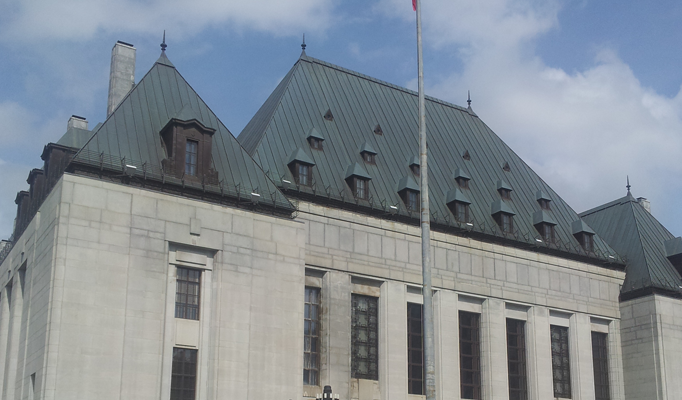
In a unanimous decision given on July 24, 2025, in a case heard by justices Wagner, Karakatsanis, Cote, Rowe, Martin, Kasirer, Jamal, O’Bonsawin, and Moreau (on November 12 and 13, 2024) The Supreme Court of Canada dismissed the constitutional challenge by appellants Mikhail Kloubakov and Hicham Moustaine (both escort service drivers) against Canada’s sex worker laws.
The Calgary Police Service and the Quebec Anti-Human Trafficking Task Force worked together and brought charges against five men. The owners of a commercial operation were convicted and the two men challenging the constitutionality of the law worked for the group. Originally, the two were convicted, but had the charges overturned with a constitutional challenge. Alberta’s Court of Appeal reinstated the conviction and the men appealed to the Supreme Court, which has now spoken.
The Evangelical Fellowship of Canada (FEBC) and the Association for Reformed Political Action Canada (ARPA) were among 24 intervenors who argued against the challenge. ARPA’s response to the ruling noted that: The Supreme Court’s reasons for its ruling agree with EFC and ARPA’s submissions that exploitation within the meaning of PCEPA does not require a specific act, such as violence, coercion, or lack of consent. While the degree of exploitation and the consequent social harms may vary from one exchange to the next, exploitation and commodification occurs in every case. ARPA and EFC argued that the act of purchasing sexual services is always exploitative, in the sense that it takes wrongful advantage of someone, which can be done even if the other person consents.
As for procuring or profiting from another person’s prostitution, ARPA and EFC argued that it was also within Parliament’s authority to define, based on its normative judgment, what amounted to exploitative third-party involvement meriting criminal sanction. Thus, Parliament could prohibit “commercial enterprises” even where the third parties running these enterprises did not pressure women into prostitution or keep most of the money paid for their services.
In Canada, prostitution is legal. Before 2014, Canadian law prohibited specific actions such as communicating in public for the purpose of prostitution, living in or operating a bawdy house, or living off the avails of prostitution. The Supreme Court struck down the Criminal Code provisions in the Bedford v. Attorney General of Canada case, citing that they violated the Charter of Rights and Freedoms through endangering sex workers. The court determined that the laws created unsafe working conditions for sex workers by keeping them from self-protection.
In response, the Government of Canada enacted Bill C-36, (the Protection of Communities and Exploited Persons Act- PCEPA). This is known as the Nordic model. This shifted the penalizing to those purchasing sexual services and to those profiting from the prostitution of others. It allowed sex workers to sell their services with some limitations. Communication for sexual purposes cannot be done near schools or playgrounds.
Some feel the law needs to be more comprehensive and that Canada should move toward complete decriminalization, working toward a health and safety framework, like has been done for some form of drugs. They feel prostitutes need to be able to do more to protect themselves, like working from fixed indoor locations, hiring bodyguards, drivers, and providing their sexual services in cost-sharing and cooperative arrangements with others in the business.
Through this decision, the Supreme Court unanimously declared that the current laws applicable to sex workers are constitutional and don’t hinder safety measures. Both Kloubakov and Moustaine are guilty of violating the Criminal Code because they profited from sex workers (2021) and they failed to prove that the security of sex workers was compromised by the laws. The issue highlighted individual liberty when it comes to inequality.
ARPA notes that: the Court did not decide the issue of whether section 7 of the Charter – the right not to be deprived of life, liberty, or security of the person, except in accordance with the principles of fundamental justice – protects the right to sell sexual services. This was not a dodge or abdication of responsibility on the Court’s part. Rather, the appellants only raised this argument at the Supreme Court and not the courts below. And neither of the appellants had been charged with purchasing sexual services, so that prohibition was not directly in issue. This argument was a last-ditch effort to call into question the legitimacy of PCEPA in its entirety.
There is an ongoing challenge to PCEPA before the Ontario Court of Appeal. The Canadian Alliance for Sex Work Law Reform (CASWLR) is waiting for an outcome, pending the specific decision by the Supreme Court. There is still some confusion as to what it means that material benefit can be obtained “in the context of a ‘commercial enterprise’ that offers sexual services for consideration.” It seems that the Supreme Court is leaving it to the lower courts to decide this on a case-by-case basis.
Since this case did not directly involve sex workers, it is likely there will be more litigation from those directly involved. There is pushback, because while sex workers may not be arrested for their business, sex work itself is still criminalized and there is a fear that the proceeds from the work could be seized.

Leave a Reply